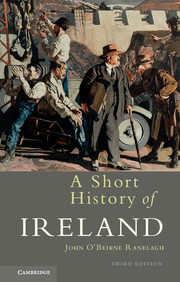Book contents
- Frontmatter
- Contents
- List of figures
- Preface to the first edition
- Preface to the second edition
- Preface to the updated edition
- Preface to the third edition
- Map of Ireland: The Pale and the Irish plantations
- Chapter 1 Beginnings
- Chapter 2 Ascendancy
- Chapter 3 Union
- Chapter 4 Home rule?
- Chapter 5 Rising
- Chapter 6 South
- Chapter 7 North
- Chapter 8 Another country
- Appendix Timeline of Irish history
- Select bibliography
- Index
- References
Chapter 4 - Home rule?
Published online by Cambridge University Press: 05 November 2012
- Frontmatter
- Contents
- List of figures
- Preface to the first edition
- Preface to the second edition
- Preface to the updated edition
- Preface to the third edition
- Map of Ireland: The Pale and the Irish plantations
- Chapter 1 Beginnings
- Chapter 2 Ascendancy
- Chapter 3 Union
- Chapter 4 Home rule?
- Chapter 5 Rising
- Chapter 6 South
- Chapter 7 North
- Chapter 8 Another country
- Appendix Timeline of Irish history
- Select bibliography
- Index
- References
Summary
The Fenians’ attempt at rebellion and their subsequent atrocities in 1867 forced Westminster’s attention upon Ireland. ‘Fenianism’, wrote the philosopher John Stuart Mill, burst ‘like a clap of thunder in a clear sky, unlooked for and unintelligible’. It had confounded the assumption that had grown since the meek submission to the famine by the Irish people that social reform was an adequate substitute for political independence, and that coercive measures could be enforced when necessary if reform was also pursued. Thus habeas corpus had been suspended at nearly all times of political and agrarian unrest (1798; 1848); the Treason Felony Act (1848) had been used against nationalist agitators, and at the same time Acts were passed granting emancipation (1829), establishing state-supported primary (1831) and higher education (1845), and reducing the tithe (1838).
Mill was one of the first to realise that a better description of England’s Irish problem might be Ireland’s English problem. In 1868 he published an essay, ‘England and Ireland’, pointing out that Fenianism involved the ideal of freedom and was not simply wanton criminality. ‘The difficulty of governing Ireland’, he wrote, ‘lies entirely in our own minds; it is an incapability of understanding.’ Englishmen liked to explain Irish malcontent as the product of ‘a special taint or infirmity in the Irish character’, but this was wrong. Instead, he said,
There is probably no other nation of the civilised world, which, if the task of governing Ireland had happened to devolve on it, would not have shown itself more capable of that work than England has hitherto done. The reasons are these: first, there is no other nation that is so conceited of its institutions and of all its modes of public action, as England is; and secondly, there is no other civilised nation which is so far apart from Ireland in the character of its history, or so unlike it in the whole constitution of its social economy; and none, therefore, which if it applies to Ireland the modes of thinking and maxims of government which have grown up within itself, is so certain to go wrong.
Mill was attacked by the Saturday Review as ‘the most recent and most thoroughgoing apostle of Communism’. The Irish landlord Lord Bessborough bluntly declared, ‘Mill ought to be sent to penal servitude as a Fenian.’ One man, however, who was influenced by Mill was William Ewart Gladstone (1809–98).
- Type
- Chapter
- Information
- A Short History of Ireland , pp. 145 - 191Publisher: Cambridge University PressPrint publication year: 2012

